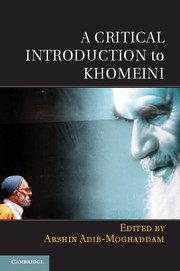Book contents
- Frontmatter
- Contents
- List of Map and Figures
- About the Authors
- Acknowledgments
- Glossary
- Timeline: The Life of Ayatollah Ruhollah Khomeini (1902–1989)
- Introduction Ayatollah Ruhollah Khomeini: A Clerical Revolutionary?
- 1 Khomeini and the “White Revolution”
- 2 The Rise of Khomeinism
- 3 Wilayat al-Faqih and the Meaning of Islamic Government
- 4 Ayatollah Khomeini’s Rule of the Guardian Jurist
- 5 Khatt-e Imam
- 6 Khomeini and the West
- 7 Gendered Khomeini
- 8 Hidden Khomeini
- 9 The Divine, the People, and the Faqih
- 10 Khomeini’s Legacy on Women’s Rights and Roles in the Islamic Republic of Iran
- 11 To Rule, or Not to Rule? An Alternative Look at the Political Life of Ayatollah Khomeini between 1960 and 1980
- 12 Khomeini and the Decolonization of the Political
- 13 Contentious Legacies of the Ayatollah
- Further Reading
- Index
- References
Introduction - Ayatollah Ruhollah Khomeini: A Clerical Revolutionary?
Published online by Cambridge University Press: 05 June 2014
- Frontmatter
- Contents
- List of Map and Figures
- About the Authors
- Acknowledgments
- Glossary
- Timeline: The Life of Ayatollah Ruhollah Khomeini (1902–1989)
- Introduction Ayatollah Ruhollah Khomeini: A Clerical Revolutionary?
- 1 Khomeini and the “White Revolution”
- 2 The Rise of Khomeinism
- 3 Wilayat al-Faqih and the Meaning of Islamic Government
- 4 Ayatollah Khomeini’s Rule of the Guardian Jurist
- 5 Khatt-e Imam
- 6 Khomeini and the West
- 7 Gendered Khomeini
- 8 Hidden Khomeini
- 9 The Divine, the People, and the Faqih
- 10 Khomeini’s Legacy on Women’s Rights and Roles in the Islamic Republic of Iran
- 11 To Rule, or Not to Rule? An Alternative Look at the Political Life of Ayatollah Khomeini between 1960 and 1980
- 12 Khomeini and the Decolonization of the Political
- 13 Contentious Legacies of the Ayatollah
- Further Reading
- Index
- References
Summary
By all standards available, Ayatollah Khomeini was a giant of the twentieth century. The Iranian revolution of 1979, which unfolded so eclectically under his leadership, quite literally shook the world. As all giants of history, Khomeini left an indelible imprint on the consciousness of his people, a stock of shared memories that is constituted by nostalgia, reverence, utopia and loyalty on the one side and exile, tragedy, anger and rejection on the other. Comparable to the impact of other revolutionary leaders of the twentieth century – Lenin, Mao, Castro – Khomeini’s era seriously affected both the personal life of the people he eventually came to govern and the trajectory of world politics.
By virtue of their gigantic projects, revolutionary leaders claim history in its entirety. Theirs is, by definition, a rebellion against the planetary order that promises to bring about universal, not relative, change. So, too, Khomeini in 1979 was not a reformist; he was not in Iran to compromise with the ancien régime of the Shah. He was there to define, once and for all, what he considered to be the ideal political and social order for human beings, that he thought applicable not only to Iran but throughout the globe. As he proclaimed from exile in Neauphle-le-Chateau at the height of the revolutionary fervour in that fateful winter of 1978/1979:
Great People of Iran! The history of Iran, even world history, has never witnessed a movement like yours; it has never experienced a universal uprising like yours, noble people! … Our lionhearted women snatch up their infants and go to confront the machine guns and tanks of the regime; where in history has such valiant and heroic behaviour by women been recorded? … Fear nothing in your pursuit of these Islamic goals, for no power can halt this great movement. You are in the right; the hand of God Almighty is with you and it is His will that those who have been oppressed should assume leadership and become heirs to their own destiny and resources.
- Type
- Chapter
- Information
- A Critical Introduction to Khomeini , pp. 1 - 18Publisher: Cambridge University PressPrint publication year: 2014
References
- 3
- Cited by



